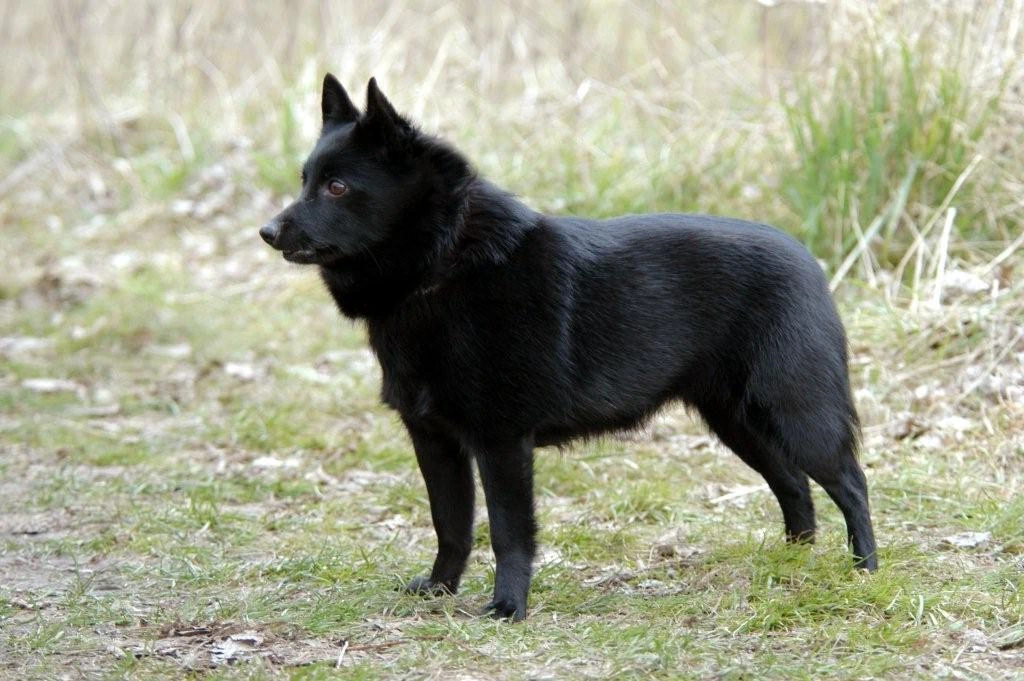Sneaking onto the scene with their energetic step and spirited demeanor, Schipperkes have sailed into the hearts of dog lovers worldwide. You’ve likely spotted their signature silhouette, with that fox-like face and plush, jet-black coat, but there’s much more to these Belgian natives than meets the eye.
As the ‘Little Captain’ of canines, they command a rich history intertwined with European mariners, and their loyalty is as steadfast as the barge workers who once cherished their company. Though small, don’t be fooled by their size; Schipperkes packs a punch of personality that rivals even the largest breeds.
If you’re considering this breed as your next four-legged friend, you’ll want to learn about their unique needs and whether their energetic lifestyle aligns with yours. Stay tuned to uncover the traits that make Schipperkes a breed apart and why they might be the perfect co-captain for your life’s adventures.
- Noise Level
- Energy
- Sociability
- Trainability
- Care
- Health
Overall
Summary
The Schipperke breed is known for its moderate noise level, high energy levels, moderate sociability, moderate trainability, average care needs, and good overall health.
Schipperke: Traits, Temperament, and Care Guide
The Schipperke, renowned for its fox-like expression and elegant physique, exhibits a spirited temperament and demands attentive care to maintain its robust health and vibrant energy.
As a proud owner, you’ll notice your Schipperke breed’s short coat and pointed ears are a hallmark of its unique appearance. The ruff around the neck adds to its distinguished look.
With their high energy and loyal and intelligent nature, your Schipperke thrives on activity. To manage their activity level, they require a commitment to regular exercise.
It’s critical for people to stay informed about their health and seek guidance from organizations like the Orthopedic Foundation for Animals to prevent common issues.
As a dedicated member of the Schipperke community, you play a vital role in nurturing their well-being and preserving the breed’s legacy.
Exploring the Characteristics of the Schipperke
Within the compact frame of your Schipperke lies a dynamic blend of characteristics, from their alert and curious nature to their fearless and confident demeanor, all demanding a closer examination to appreciate this breed’s complexity fully. As the Belgian Little Captain, the Schipperke is an intelligent small dog with a lustrous black coat, often reflecting their historic role as ratters and guardians of the boats.
| Trait | Description | Relevance |
|---|---|---|
| Size | Small yet sturdy, a true compact power | Ideal for guarding the boats in confined spaces |
| Coat | Thick, black, and weather-resistant | A signature look that is easy to maintain |
| Intelligence | Highly intelligent, trainable | Excels in obedience and problem-solving tasks |
| Temperament | Alert, curious, fearless, and confident | Makes a vigilant companion and a tenacious ratter |
Your Schipperke is a testament to the adage that dynamism comes in small packages.
Schipperke: A Comprehensive Profile and Guide
You’re about to explore the Schipperke’s rich heritage, which anchors their tenacious character and utility on Belgian barges.
Their compact stature belies a robust, agile nature, suited to vigilant companionship and spirited play.
As you consider this breed, understand that its need for stimulation and exercise is as integral to its well-being as its storied past is to its identity.
Everything You Need to Know
Delving into Schipperke’s background reveals a breed steeped in history. This Belgian breed originated centuries ago, with a name that means ‘little captain,’ a nod to its guarding prowess and historical role on canal barges. It combines a no-nonsense work ethic with spirited companionship for a dog as alert as it is affectionate.
To fully appreciate the Schipperke, consider these key traits:
- Heritage: A descendant of early European rat dogs, with deep roots in the Flemish region.
- Temperament: Notably intelligent, fiercely loyal, and innately protective.
- Physicality: Compact yet robust, sporting a fox-like expression and lustrous black coat.
- Health: Vigorous breed with a life expectancy of around 13 years, though watchful for breed-specific ailments.
Embrace the Schipperke – a small but mighty companion eager to join your fold.

Discovering the Temperament
Exploring the temperament of the Schipperke reveals a breed that’s not only fiercely loyal and alert but also imbued with a confident fearlessness that makes them exceptional family protectors.
This intelligent breed originated as a versatile companion adept at both companionship and guardianship. Often referred to as the ‘all-black devil,’ the Schipperke possesses a mischievous streak and sometimes acts as an escape artist. Consequently, giving them plenty of exercise is a good idea to channel their energy constructively.
Their sharp intellect and playful nature make them suitable for engaging with young children, though their boldness requires mindful socialization.
As a member of your family, the Schipperke will integrate with a sense of belonging, vigilantly assuming the role of a miniature guardian with a grand heart.
Schipperke: Is It a Good Fit for Families?
Considering Schipperkes’ strong loyalty and protectiveness, they can be excellent companions for families, particularly if you’re looking for a devoted and alert pet.
Their need for regular exercise and mental challenges matches well with active households, ensuring they’re a complementary fit for families who value engagement and play.
However, their history as vigilant watchdogs requires thoughtful socialization to ensure their protective instincts are well-managed around children and guests.
Assessing Schipperke’s Compatibility with Families and Kids
When assessing the Schipperke’s compatibility with families and children, it’s crucial to understand that while they can be affectionate with their human pack, their high energy and strong prey drive may pose challenges in households with young kids or other small pets.
Here are key considerations:
- Temperament: Schipperkes are protective and may display fearless behavior, which requires vigilant supervision around children.
- Exercise Needs: With a requirement of at least 30 minutes of daily activity, these dogs need engagement to prevent mischief.
- Guarding Instinct: The Belgian little captain’s natural propensity for guarding can be both a pro and a con, depending on the family’s needs.
- American Kennel Club Guidelines: Consult AKC resources to understand the breed’s characteristics and ensure they align with your family’s lifestyle.
Schipperke Adjustability Quirks
Schipperkes’ adaptability to apartment living hinges on their owners’ commitment to providing ample exercise and consistent training to manage their spirited energy levels. These Belgian barge dogs, historically known as ‘little boatmen’ due to their guarding roles on Flemish canals, possess a high prey drive that may lead to chasing smaller pets.
It’s vital to carefully introduce them to other animals to ensure a harmonious household.
As their quirks stem from an independent and sometimes stubborn nature, your Schipperke will require patient, firm training to thrive in compact living spaces. Regular grooming is also crucial; maintaining their unique coat bolsters their health and reinforces the bond between you and your little captain.
Embrace these adaptability challenges, and you’ll navigate a rewarding journey together.
Schipperke Training Essentials

To effectively harness your Schipperke’s sharp wit, you must establish a training regimen that’s both consistent and rooted in positive reinforcement.
Considering their propensity for stubbornness, your patience and persistence are critical in shaping their loyal and protective nature through training.
Early socialization and regular mental challenges are key to mitigating their natural wariness and preventing any unruly behavior from boredom.
Effective Training Strategies
Regular and consistent training is crucial for channeling the Schipperke’s sharp intellect and rapid learning capacity into positive behaviors. Effective training strategies for this Belgian breed go beyond the basics. They demand consistency, which leads to success in obedience and behavioral training, which are essential for a well-mannered Schipperke, especially if you’re aiming for dog show accolades.
| Strategy | Description | Benefit |
|---|---|---|
| Positive Reinforcement | Reward desired actions with treats or praise | Encourages repetition of good behavior |
| Socialization | Introduce to various environments and beings | Prevents fearfulness and aggression |
| Leash Training | Teach to walk without pulling or wandering | Ensures safety and obedience during outings |
Exercise and Grooming Needs
Maintaining your Schipperke’s vibrant energy and health demands consistent exercise routines, alongside a grooming schedule that includes weekly brushing to mitigate shedding and prevent their fur from matting.
Schipperkes, originally bred for their sharp minds and agility, thrive on at least 30 minutes of daily exercise. This keeps them fit and wards off boredom and the potential for behavior issues.
Their exercise and grooming needs extend to regular nail trims to sidestep discomfort, ensuring their petite paws are ready for any challenge. Best known for guarding, the Schipperke’s lush ruff around the neck remains tangle-free with minimal trimming, highlighting their distinctive silhouette.
Adhering to these care protocols diligently can reduce health problems and keep your Schipperke looking as noble as the Dog Breeds they stand among.
Health Considerations
When considering Schipperke’s health, you must recognize their relatively long median lifespan of 13 years, with many surpassing this age.
You should be aware that lack of exercise and overfeeding are risk factors for joint and skeletal issues, which can be exacerbated by the breed’s predisposition to certain genetic conditions.
Proactive, regular veterinary care is essential to mitigate common ailments such as luxating patella and Legg-Perthes syndrome, as well as to monitor for signs of epilepsy and MPS IIIB.
Common Health Issues and Lifespan
While Schipperkes typically enjoy a median lifespan of 13 years, their longevity can be compromised by common health issues that necessitate vigilant care and preventative measures.
As a Schipperke owner, you’re part of a community that cherishes this breed, often called the Black Sheepdog or the Belgian little captain.
It’s crucial to remember that although they’re known for their spirited demeanor, Schipperkes require regular exercise and a balanced diet to prevent joint and skeletal issues.
Historically, tradesmen kept these dogs for their agile and hardworking nature, yet today, they’re prone to conditions like luxating patella and Legg-Perthes syndrome.
Epilepsy and MPS IIIB genetic mutation also pose risks, underscoring the importance of routine veterinary check-ups for your Schipperke’s health.
Is Schipperke the Right Dog for You?
If you’re seeking a lively and devoted companion, the Schipperke may be an ideal match, given its robust energy levels and need for mental engagement. As a descendant of the Belgian shepherd, this ‘pocket battleship’ boasts remarkable abilities that align with an active lifestyle.
In the United States, the Schipperke Club of America recognizes their aptitude for being excellent sleuths around your house, ensuring you’re never alone.
Before deciding if a Schipperke is the right dog for you, ensure you’re prepared to meet their exercise demands, mental stimulation needs, and grooming requirements for their striking black coat. With a median lifespan of 13 years, your long-term commitment encompasses love, care, and regular health check-ups to forestall genetic issues.
Alternatives for Schipperke: Alert and Energetic Small Breeds
Explore these breeds if you appreciate the Schipperke’s alertness and energy, perfect for those who enjoy spirited and active small dogs.
| Similar Dogs | Short Description |
|---|---|
| Miniature Pinscher | Small but assertive, known for its energy and strong character. |
| Rat Terrier | Known for its agility and playful nature, great for active families. |
| Pomeranian | A tiny, fluffy breed full of personality and charm. |
| Jack Russell Terrier | A small, energetic breed, known for its bold and hunting character. |
| Cairn Terrier | A fearless and energetic breed, ideal for active lifestyles. |
Conclusion
In sum, diving into Schipperkes’s world is like unlocking a treasure chest of loyalty and liveliness. Compact yet full of courage, they demand your commitment to training, exercise, and health upkeep.
Tailor-made for those who appreciate an alert, affectionate companion, this breed isn’t just a pet; it’s a vigilant guardian in a pint-sized package.
Assess your lifestyle meticulously before welcoming this ‘Little Captain’ aboard your family ship.
